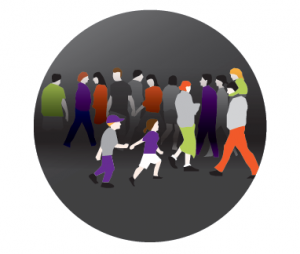1.“Prostitution is the oldest profession in the world.”
Let us change the perspective: pimping could indeed be considered the oldest profession in the world. In any case, just because something has existed for a long time does not mean that it should or cannot be changed. We do not say “murder has been around forever: we cannot do anything about it”.
A CHOICE?
2.“It is a job like any other.”
Do you know any other job where people face a mortality rate 10 to 40 times above the average? Where 60 to 80% of “workers” experience regular physical and sexual abuse? If this is a job like any other, how come so few women take the opportunity? How come the overwhelming majority are migrant women? Does this mean that this so called “job” is only for the foreign women in your country? For the sake of gender equality, should we campaign to promote this job for men? There are trade unions in Europe that do not see prostitution as a job as it is incompatible with the safety and the dignity, as well as the “career” progression, associated with a profession.
3.“Prostitution brings women economic independence, especially to migrant women.”
In times of economic crisis, with high unemployment, with thriving racist attitudes, it would be very easy to say that prostitution is a solution for women in general, and for migrant women in particular. It would even help to reduce unemployment rates! Real issues for migrant women are about: labour market access, qualification recognition and family reunification rights. Economic independence should not come at the cost of harm and abuse. In the 21st century, we have to do better.
4.“It is a choice.”
“If women had more economic choices in this society, they would not choose to be abused in prostitution”, says Fiona Broadfoot, survivor from the UK. Choice is always related to a context. Today in Europe, gender equality is not a reality: just look at the gender pay gap (16%), the prevalence of violence against women (1 in 5 women victim of domestic violence), sexist stereotypes, underrepresentation of women in business, academia and politics (24% of national parliamentarians)… In a context where many women face discrimination, poverty and violence, consent can be bought with money. Extensive research indicates that poverty, family loss, homelessness, drug addiction and a history of physical and sexual abuse combine to make young women vulnerable to entering prostitution. Moreover, the majority of women who enter prostitution first do so very young. Would you want your daughter or sister to choose prostitution? She could start Tomorrow

5. “Prostitution brings a lot of money.”
To whom? According to Interpol in Europe, a pimp earns 110 000 euros per year and per woman in prostitution. If prostitution were such a good job, how come the majority of women in prostitution do not own a car, an apartment or save money for the future? The idea that prostitution brings a lot of money is a myth. Moreover, debating on the amount of money earned in prostitution is a dishonest strategy: whatever the amount, prostitution is about someone buying access to your body and sexuality.Human beings are priceless
6: “Prostitution is about sexual freedom, abolition is anti-sex.”
Let us be more precise: whose sexual freedom are we talking about? Everyone agrees that sexual freedom consists of enjoying sexual health and rights, based on equality and free from any discrimination, coercion or violence (definition of the World Health Organisation). Prostitution is not about sex, it’s about power: the purchase of sex is the denial of the other person’s desire. Paying for sex is denying another person’s right to sexual desire and consists of a profound disempowering of sexual agency in another human being. In other words, buying sex from someone can never be about sexual freedom. Abolitionists are pro-sex: they want genuine sexual freedom and equality between women and men, and this cannot be achieved as long as sexuality is placed within the scope of the market.
SEXUAL FREEDOM?
7: “Prostitution is part of women’s historical struggle to control their body.”
In the 1970s in Europe, women indeed struggled for the recognition of their reproductive and sexual rights, in particular the right to safe abortion. They were denouncing structural gender inequality and therefore any authority imposing its views on women’s human rights: religion, tradition… and the market. The commodification of sexuality and women’s bodies cannot be considered part of a collective struggle for women’s rights: prostitution is about men entitling themselves to buy sex, it is not about realising gender equality.
8: “Some women claim that it is their right to prostitute themselves.”
Some people freely accept to work for less than the minimum wage (especially undocumented migrants for example); some even agree to sell one organ. In both cases, our society has decided to protect the most vulnerable and guarantee decent life for all; in such cases, the law therefore condemns the employer, or the buyer of the organ. Similarly, the law should criminalise the sex buyer, not the person in prostitution. Some persons might indeed claim that they choose to be in prostitution; but a democratic society is not built on the basis of individual claims that don’t reflect the situation of the overwhelming majority. At stake is the future we are creating, the society we want to live in. In this day and age, we should be more concerned about women’s and men’s right not to be in prostitution.
9: “Only “sex workers” should talk about prostitution, because they know best.”
Should only women who have been victim of domestic violence be entitled to denounce intimate partner violence? Domestic violence is recognised as a structural form of violence against women, that affects us all, women and men, because it is about societal values. Prostitution also affects us all: it conveys norms and representations to young people, it is trivialized and even glamorised by the media and the culture industry. No wonder the insult ‘whore’ is so widespread! Moreover, for every mediatised “sex worker”, there are many survivors of prostitution, who very rarely speak out, because of the trauma linked to their experience. And millions of persons still in prostitution, who are invisible. It is time to listen to them.

10: “Prostitution is useful for society, especially for socially isolated and lonely men.”
Sex buyers do not fit this stereotype: international research shows that the majority of sex buyers are men married or in a relationship, and are more likely to have a larger number of sexual partners (not through prostitution) than the rest of the male population. By justifying prostitution as a social institution, one would imply that some women are to be sacrificed for the “needs” of these men. Luckily, you or your sister/wife/daughter/friend is not part of the sacrificed ones. Women in prostitution are first and foremost women; they should all enjoy the same equal rights and human dignity.
11: “Demand will never disappear.”
What a sad vision of men…: according to this assumption, men are driven by their so-called sexual “irrepressible needs”, not by their brain. It is all the more surprising to believe, as the majority of men are not sex buyers. Demand is justified by a certain vision of masculinity, related to virility or strength, all stereotypes about men conveyed in our unequal societies. Demand can be reduced by education, prevention and legislation. It is as simple as that. Fatalism is used by people who do not want to change society.
SOCIAL UTILITY?
12: “Abolishing prostitution would lead to more rapes.”
Actually, it is the other way round: studies have shown that men buy sex simply because it is possible. The normalisation of prostitution on the contrary fosters acts of violence against women, by sending the social signal that women are commodities. Nevada, where pimping has been decriminalised, sees the highest rate of rape compared to the other American states. In a study on men, 54% of prostitute-users recognised having had aggressive sexual behaviour towards their partner(s).
13: “Legalising Prostitution is the best way to guarantee access to basic rights for people in prostitution.”
Being in prostitution is “legal” everywhere in Europe (except Croatia where it is criminalised). The issue of accessing rights is not linked to the legal status of prostitution, it is linked to the migration status of each person: if you are legally staying in a country, each person: if you are legally staying in a country, testing and health care. If you are undocumented you will not have access to these rights, including in countries that legalise or decriminalise prostitution; it has nothing to do with being in prostitution or not. In Germany, only 44 persons have registered as “professional sex workers”, out of the estimated 400 000 persons in prostitution. Legalising prostitution (or decriminalising “sex work” and therefore pimping) does not change the stigma on persons in prostitution.

14: “We must combat trafficking, but prostitution has nothing to do with it.”
Such claims contradict the reality: if prostitution has nothing to do with sex trafficking, what exactly are women trafficked for? According to EU data, 62% of trafficking in the EU is for sexual exploitation. Trafficking is profit-driven, and has a direct link with the prostitution markets, where the demand fuels the supply. It is estimated that the benefits from trafficking for sexual exploitation amount to US$ 27.8 billion. And where does this money come from? From the buyers, like in any other business. This is why prostitution and trafficking are intrinsically linked.
15: “With the Swedish model, persons in prostitution face more violence as prostitution goes underground.”
If buyers can find and meet with women in prostitution, so can the police and social workers! By criminalising sex buyers, the Swedish model changes the relationship between women and buyers: buyers are the criminals. Women in prostitution, who have been to Germany before joining Sweden, said to the Stockholm police prostitution unit that there is much more violence in legal brothels as sex buyers are entitled to do what they want, as they are the “clients”. Social workers in Sweden see that persons in prostitution feel more confident to come forward for assistance. On the contrary, in countries were brothels are legal (like Australia or Germany), service providers and law enforcement say that they have limited access to women. Legalising prostitution will not change the reality: prostitution is a form of violence. 68% of women in prostitution suffer from the symptoms of post-traumatic stress disorder, like victims of torture or veterans of war.
UTOPIA?
16: “We should not criminalise sex buyers because they can save women or identify victims of trafficking.”
Maybe you have watched “Pretty woman” too many times. A sex buyer who “saves” a woman, or report a case of trafficking, is still a sex buyer. The existence of “nice sex buyers” does not reduce demand, it just comforts a romantic vision of prostitution that has nothing to do with reality. Moreover, the “nice sex buyers” are a very tiny minority among sex buyers: punters’ websites are very revealing in that perspective. Here are some quotes: “Reasonable blow job but just a bad attitude and making no effort to look interested or even pretend to enjoy”; “it was like fucking an attractive sack of spuds” (The invisible men Tumblr).
17: “Abolitionists want to prohibit prostitution.”
There is a great difference between the prohibitionist approach, which criminalises all actors in the system of prostitution, including prostituted persons, and the abolitionist approach that targets only the buyers, pimps and traffickers, in other words those who hold the power of choice. Simply penalising everybody does not address the root causes and gendered nature of prostitution. Abolition is about qualifying the structural, economic, psychological and physical violence inherent to prostitution, and therefore protecting the persons affected, and criminalising the perpetrators, i.e. the sex buyers. Abolition is about proposing concrete alternatives to persons in prostitution and changing mentalities.
18: “The abolition of prostitution is utopia.”
Abolishing prostitution does not equal eradicating it. Rapes, murders or paedophilia are prohibited, but still exist. What is important is the social norm conveyed by legislation: it anchors amongst human rights the principle that the human body and sexuality are not for sale. It creates the conditions for a genuine equal society to be realised.


